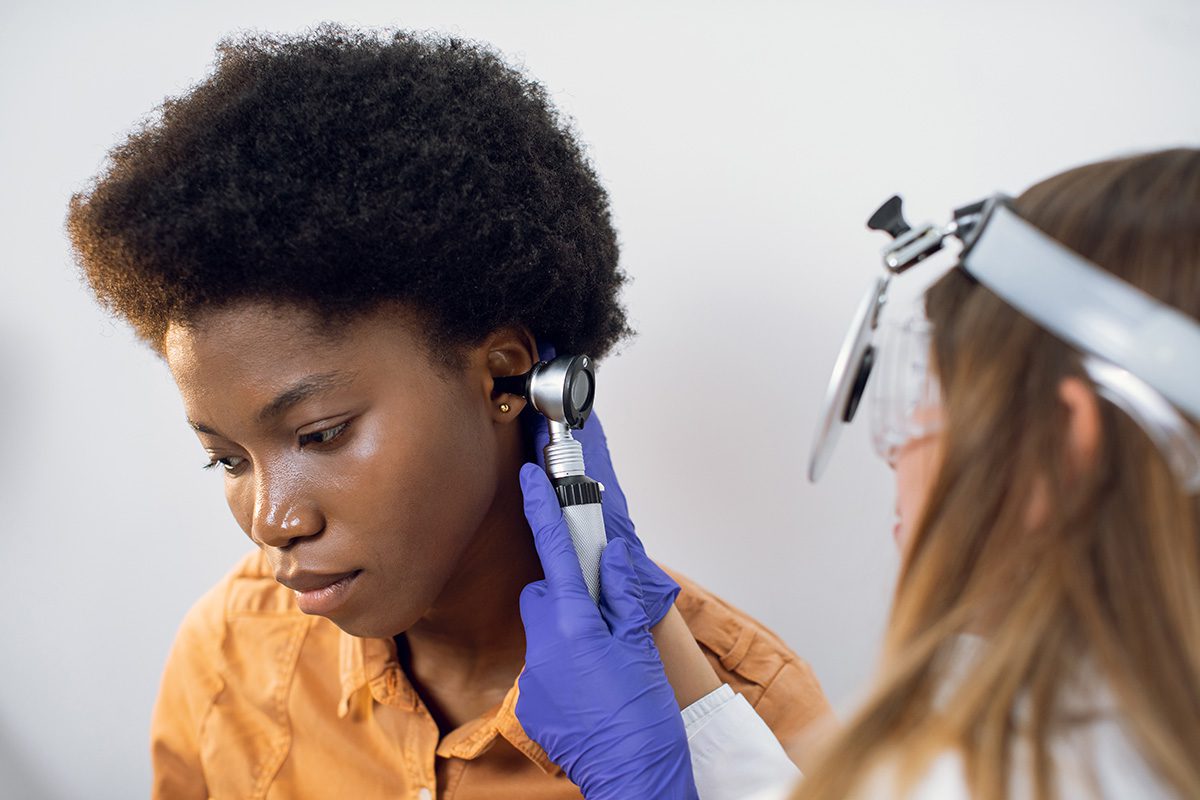Balance, Dizziness & Vertigo
Dizziness is a blanket term used to describe any feeling of unsteadiness. It is one of the leading health complaints in the United States, affecting an estimated 9 million people annually. For those over the age of 70, it’s the top reason for a visit to the doctor’s office. Balance problems are the result of your brain receiving false signals from the balance system, comprising the inner ear, eyes, and sensory nerves. It may sense movement and overcompensate, leading to a spinning sensation, weakness, and faintness. There are many possible causes of dizziness and vertigo, and our experts have the diagnostic tools to uncover the underlying cause of your disequilibrium and treatment options to keep you on your feet.

DIZZINESS & VERTIGO
Dizziness is the result of your brain receiving false signals from the balance system. The system senses movement and overcompensates, leading to a spinning sensation, weakness and faintness.
There are many possible causes of dizziness including low blood pressure, anemia, dehydration, heat-related disorders, endocrine system disorders (e.g., diabetes, thyroid disease), heart conditions, high blood pressure, viral and bacterial infections, head trauma, hyperventilation, neurological disorders, and certain medications.
Several balance disorders are commonly associated with dizziness and/or vertigo. Benign Paroxysmal Positional Vertigo (BPPV) involves brief but intense periods of vertigo that are triggered by specific changes in head position. It occurs when tiny crystals in the otolith organs become dislodged and migrate to the semicircular canals. Meniere’s disease is a chronic condition that causes vertigo, tinnitus, fullness in the ear, and fluctuating hearing loss that may eventually become permanent. Meniere’s disease is usually confined to one ear and though its cause is unknown, it may be the result of abnormal fluid buildup in the inner ear. Labyrinthitis is an inflammation of the inner ear usually caused by an infection. Its symptoms include vertigo, temporary hearing loss and tinnitus.
VESTIBULAR TESTING
Vestibular testing involves a series of tests that are administered when you are experiencing dizziness. They are used to determine whether symptoms of dizziness are being caused by the balance system of the inner ear.
The vestibular system is complex and responsible for many of the body’s functions. In order to narrow down the exact cause of dizziness, it is necessary to administer a variety of tests. These measure eye movements, head movements, hearing and more.
Diagnostic Tests for the Vestibular System
Studies indicate vestibular testing is extremely thorough and accurate in identifying inner ear disorders. Vestibular testing is also helpful in determining whether additional diagnostic testing, such as an MRI, is needed. A battery of tests is administered in most cases. The most common ones include:
- Electronystagmography (ENG). This series of tests measures eye movements via electrodes placed around the eyes. ENG tests usually consist of four parts: evaluation of rapid eye movements, tracking tests to measure eye movements as they follow a visual target, positional test for measuring dizziness in response to different head positions and a caloric test that measures responses to warm and cold water circulating through a tube in the ear canal. Most people reporting dizziness or vertigo will be given ENG tests initially.
BPPV
Benign paroxysmal positional vertigo, commonly referred to as BPPV, is a vestibular disorder that causes vertigo. It occurs when calcium deposits in the inner ear become dislodged from the otolithic membrane and settle in the semicircular canals. Any change in the position of the head causes these tiny crystals to shift, triggering dizziness.
Causes
It isn’t always known what causes these calcium deposits to break loose, though this is commonly the result of a head injury, inner ear infection, damage from ear surgery or prolonged back position associated with bed rest. Migraines might also play a role. Older patients are susceptible to degeneration of the otolithic membrane related to normal aging.
Symptoms
BPPV is the most common cause of vertigo. The episodes of vertigo may be severe, but usually lasts for less than a minute. Other symptoms include dizziness or lightheadedness, loss of balance, blurred vision, nausea, vomiting and concentration difficulties.
BALANCE TESTING
With such a wide range of hearing and balance disorders, many of which have similar symptoms, it’s important for an ear, nose, and throat specialist to make an accurate diagnosis in order to come up with a successful treatment plan. Diagnostic testing plays an important role in determining the condition responsible for a patient’s suffering.
An ENT physician has several diagnostic tests available, ranging from X-rays and CT scans to more in-depth tests. Here are some of the most common:
Acoustic Immittance Measures
These tests evaluate the eardrum and middle ear and are used to determine which part of the ear is affected by hearing loss.
Allergy Testing. Used to determine the allergens responsible for triggering an immune system response. These include skin prick and blood tests. A food sensitivity blood test called ALCAT may also be used. ALCAT can test more than 450 individual foods, additives, colorings, medicinal herbs, and chemical substances. This information can help patients uncover the foods and other substances that trigger chronic inflammation, which can be related to several other health issues.
Audiometry
This hearing exam measures your ability to hear different sounds, pitches, and frequencies. It can determine the nature and extent of your hearing loss and whether you will benefit from hearing aids or surgery.
Auditory Brainstem Response (ABR). This neurologic test provides information about the electrical activity in the auditory pathway between the inner ear and the brain and measures a person’s hearing sensitivity.
Electrocochleography. This test is used to determine whether there is excess fluid in the inner ear by measuring the electrical currents generated by sound stimulation and can help with the diagnosis of Meniere’s disease and other balance or hearing disorders.
VNG
Videonystagmography, or VNG testing, is an exam of the balance system. It is used to determine the cause of a patient’s dizziness. Specifically, it measures whether a balance disorder can be attributed to a vestibular deficit (inner ear disease).
How VNG Testing Works
VNG testing uses a combination of video goggles and infrared cameras to measure involuntary eye movements, called nystagmus. Neural connections extend from the balance mechanism in the inner ear to the muscles of the eye. Rapid eye movements, which can only be captured using high-tech equipment, can indicate a disorder of the balance system. During a VNG test you are given a series of visual tasks and the camera records your eye movements.
There are generally four parts to VNG testing. In addition to evaluating rapid eye movements, a tracking test measures eye movements as they follow a visual target, a positional test measures dizziness in relation to different head positions, and a caloric test evaluates responses to warm and cold water introduced through a tube in the ear canal. Testing is non-invasive and usually lasts between 60 and 90 minutes. There may be episodes of brief dizziness and some minor discomfort from the goggles, but otherwise you’re unlikely to experience side effects.
What to Expect on Your First Visit
Our resource center provides support to our patients and offers helpful information to make your experience as pleasant as possible. We have a number of patient information forms available for download, as well as pre- and post-operative surgery instructions, insurance providers and a list of frequently asked questions. Can’t find what you’re looking for? Give us a call and we’ll help you out.


Mollie Sylvester, AUD

Katherine Duhon, AUD

Tia Castille, AUD

Megan Mcclure
TESTIMONIALS
The office facility is always bright and comfortable. The nurses, staff, practitioners, and doctors are very knowledgeable and courteous when explaining my health issues and insurance coverages. Great office of professionals.
The team at Acadian ENT & Facial Plastic Surgery Center made my visit a very positive, informative & pleasant experience! The entire staff were welcoming & professional. My fear was taken from me by the knowledgeable information given me by the medical staff. I would highly recommend Acadian Ear, Nose, Throat & Facial Plastic Surgery Center to anyone in need of this type of medical care!
Recently I had to visit an ENT for the very first time. I had no idea what to expect and very little understanding of what my issues were. Everyone at Acadian ENT were absolutely a delight to work with. They were caring, professional and pleasant from the moment we walked in the door. Each person that we interacted with explained my symptoms & treatment thoroughly and with a smile. I can’t recommend this place enough. 10 stars!
Every time I have an appointment here, they are Friendly, Professional, and go beyond trying to make you feel comfortable. But best of all they are absolutely the BEST!!!

Schedule an Appointment
*REQUIRED FIELDS
"*" indicates required fields


